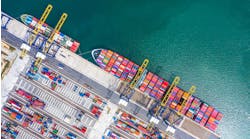The anti-counterfeiting and brand protection (ABP) market is expected to expand globally between 2010 and 2015, according to a new study by analyst firm ARC. ARC expects the overall ABP technologies software and service market to continue to expand globally through 2015. The ABP market grew significantly over the past couple of years due to the high growth in counterfeit goods. Drug counterfeiting is increasing worldwide, with more sophisticated counterfeiters and increased online purchasing.
“Manufacturers cannot afford to take a chance on counterfeit products infiltrating the supply chain,” says Janice Abel, principal analyst and the author of the study. “This is especially important if the counterfeit is a risk to safety, health, or liability. Manufacturers must secure their supply chains to deter counterfeiting; it’s not worth the risk not to. The Internet has fueled the counterfeit market which in turn has stimulated the demand for ABP solutions.”
The ABP market contains information on technologies being used to deter counterfeit products including human-readable markers (overt), machine-readable markers (covert), printers, applicators, authenticators, track and trace software, serialization, and e-pedigree software.
Counterfeit parts increasingly infiltrate the supply chain and nearly every manufacturer is at risk today. Counterfeiting is a concern for nearly every product, company, supply chain, government and industry—and the problem is on an upward trend. Almost no product or nation is immune to this phenomenon. Some counterfeit products are packaged and labeled or re-labeled to look like real brand-name and generic products to deceive consumers into thinking that they are buying the authentic product, be it medicine, food, or fertilizers. Counterfeit products are a real and growing threat for almost all manufacturers.
Globally, manufacturers deploy anti-counterfeiting technologies to reduce the risks associated with counterfeit products. Anti-counterfeiting technologies offers substantial benefits to manufacturers who need to protect their supply chain.
The Internet and the increase in counterfeit products will continue to stimulate the market to employ ABP technologies and deter counterfeiters. This will be especially true as government regulations and requirements are standardized for compliance and supply chain visibility. The economy has increased consumers’ desire to purchase “cheaper” products over the Internet and increased manufacturers’ need to reduce counterfeit products in the supply chain and improve profits. Liability, safety and risk all play a role in the demand for ABP technologies. Related issues include diversion of legitimate products to unintended markets or retail outlets. This may not necessarily be illegal, but cost manufacturers millions of dollars every year.
Depending upon the product, counterfeit products can cause concerns for safety and health, and possibly even resulting in deaths. Counterfeit products in this category can include brake pads, aviation parts, electrical cords, electronic components, chemicals, fertilizers, food, medical devices, medical supplies and pharmaceuticals. For these types of products, companies must take preventive measures to deter counterfeiting, and must do so immediately, the ARC study advises.


